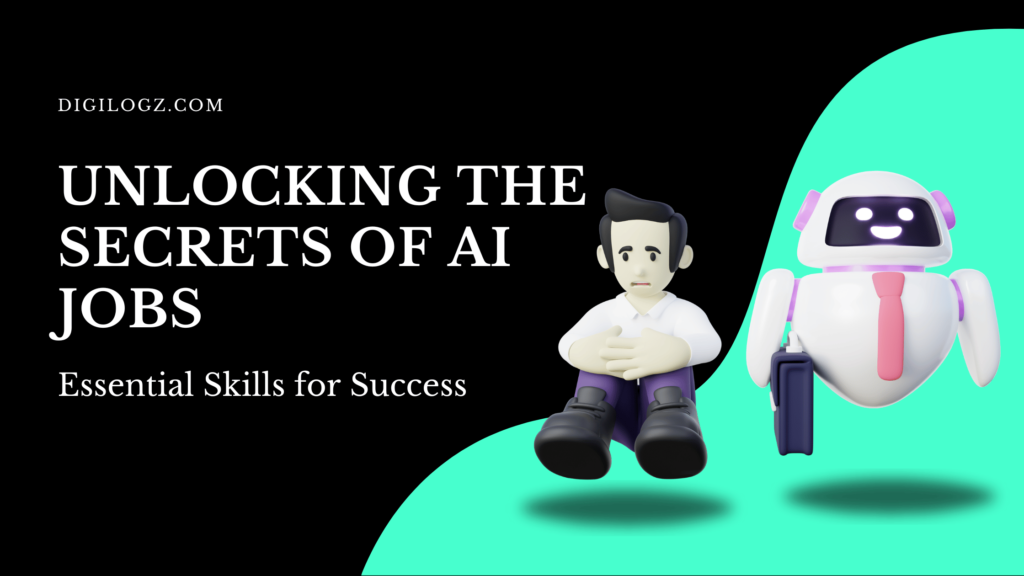Introduction
In today’s digital age, the realm of artificial intelligence (AI) is experiencing unprecedented growth and innovation AI Jobs based skills are most important. From virtual assistants to self-driving cars, AI technologies are revolutionizing industries and transforming the way we live and work. With this surge in AI adoption comes a high demand for skilled professionals who can harness the power of AI to drive progress and innovation. However, succeeding in the field of AI requires more than just technical know-how. In this blog, we’ll explore the essential skills needed to thrive in AI careers and unlock the secrets to success.
Understanding the AI Job Market
The AI job market is booming, with opportunities abound for those with the right skills and expertise. From tech giants to startups, companies across industries are seeking AI professionals to develop cutting-edge solutions and drive innovation. Roles in AI span various disciplines, including machine learning engineering, data science, natural language processing, computer vision, robotics, and AI research. Whether you’re passionate about developing algorithms or building intelligent systems, there’s a role for you in the exciting world of AI.
Why Acquiring Skills Matters
In the competitive landscape of today’s job market, having the right skills is essential for success in AI careers. Employers are not only looking for candidates with technical expertise but also those who possess strong soft skills and domain knowledge. By acquiring the necessary skills, you’ll not only enhance your employability but also position yourself for long-term success and growth in the field of AI.
Types of AI Jobs
Before delving into the essential skills needed for AI careers, let’s take a closer look at the different types of roles within the AI field:
- Machine Learning Engineer: Responsible for designing and implementing machine learning algorithms and models.
- Data Scientist: Analyzes large datasets to extract insights and drive decision-making.
- Natural Language Processing (NLP) Specialist: Develops algorithms and models for understanding and processing human language.
- Computer Vision Engineer: Builds systems that can interpret and analyze visual data.
- Robotics Engineer: Designs and develops intelligent robots capable of autonomous decision-making.
- AI Researcher: Researches to advance the frontiers of AI technology.
Each of these roles requires a unique set of skills and expertise, ranging from programming languages to domain-specific knowledge.
Technical Skills
Mastering Programming Languages
One of the fundamental skills for AI professionals is proficiency in programming languages such as Python, Java, and C++. These languages serve as the building blocks for developing AI applications and implementing machine learning algorithms.
Navigating Machine Learning and Data Science
A solid understanding of machine learning algorithms and data science techniques is essential for AI careers. From supervised learning to deep learning, AI professionals need to be well-versed in a variety of algorithms and methodologies for building intelligent systems.
Table: Comparison of Programming Languages for AI Development
| Programming Language | Pros | Cons |
| Python | Easy to learn and widely used in AI | Slower execution compared to compiled languages |
| R | Excellent for statistical analysis | Limited libraries for non-statistical tasks |
| Java | Strong object-oriented programming | Verbosity and boilerplate code |
| C++ | High performance and memory efficiency | Steeper learning curve for beginners |
Problem-Solving with Algorithms
AI professionals must possess strong problem-solving skills and a deep understanding of algorithms and data structures. Whether it’s optimizing algorithms for performance or developing new ones from scratch, the ability to tackle complex computational problems is essential in AI roles.
Soft Skills
Communication and Collaboration
Effective communication and collaboration are crucial for AI professionals, who often work in multidisciplinary teams. From explaining technical concepts to non-technical stakeholders to collaborating with engineers and designers, strong communication skills are essential for success in AI careers.
Critical Thinking and Analytical Skills
AI professionals need to be critical thinkers who can analyze data, identify patterns, and make informed decisions. Whether it’s evaluating the performance of a machine learning model or troubleshooting issues in a production system, strong analytical skills are essential for success in AI roles.
Adaptability and Continuous Learning
The field of AI is constantly evolving, with new technologies and methodologies emerging at a rapid pace. AI professionals must be adaptable and willing to learn new skills to stay ahead of the curve. Whether it’s mastering a new programming language or diving into a new area of research, continuous learning is essential for success in AI careers.
Industry-Specific Skills
Understanding Industry Trends
AI professionals should have a deep understanding of industry trends, challenges, and opportunities to develop tailored solutions that address specific business needs. Whether it’s healthcare, finance, retail, or manufacturing, domain expertise is essential for success in AI roles.
Domain Expertise
Domain expertise in areas such as healthcare, finance, or retail can give AI professionals a competitive edge in the job market. By understanding the unique challenges and requirements of different industries, AI professionals can develop solutions that deliver real value to organizations.
Business Acumen
AI professionals should possess business acumen and strategic thinking to align AI initiatives with organizational goals. Whether it’s identifying opportunities for AI adoption or developing business cases for AI projects, a deep understanding of business principles is essential for success in AI careers.
Table: Top Skills Required for AI Jobs
| Skill | Description |
| Python Programming | Proficiency in Python is essential for AI professionals due to its versatility and ease of use. |
| Machine Learning | Understanding of machine learning algorithms and techniques is crucial for building intelligent systems. |
| Data Analysis | Ability to analyze large datasets and extract meaningful insights using statistical methods and tools. |
| Communication Skills | Effective communication is vital for conveying complex technical concepts to diverse audiences. |
| Critical Thinking | Strong critical thinking skills enable AI professionals to analyze problems and devise innovative solutions. |
| Domain Expertise | Knowledge of specific industries enhances the effectiveness of AI solutions tailored to their needs. |
| Business Acumen | Understanding of business principles helps align AI initiatives with organizational goals and objectives. |
Additional Skills
Ethical Understanding
As AI technologies become increasingly integrated into our daily lives, it’s essential for AI professionals to have a strong ethical understanding. Whether it’s ensuring fairness and transparency in AI algorithms or protecting user privacy, ethical considerations are paramount in AI development and deployment.
Creativity and Innovation
Creativity and innovation are essential for AI professionals to develop novel solutions to complex problems. Whether it’s designing new algorithms or exploring unconventional approaches to AI development, creativity is key to pushing the boundaries of AI technology.
Project Management
AI professionals should possess project management skills to effectively plan, execute, and oversee AI projects. Whether it’s managing resources, timelines, or stakeholders, strong project management skills are essential for ensuring the success of AI initiatives.
Free Resources to Learn AI
Fortunately, there are plenty of free resources available online for aspiring AI professionals. From online courses and tutorials to coding exercises and research papers, there’s no shortage of opportunities to learn and practice AI skills. Some notable resources include Google AI, Amazon AI, Microsoft AI, Stanford AI, MIT AI, Coursera, Fast.ai, Kaggle, OpenAI, Hugging Face, PyTorch, TensorFlow Playground, and Keras.
Table: Educational Backgrounds of AI Professionals
| Educational Background | Percentage of AI Professionals |
| Computer Science | 50% |
| Mathematics | 20% |
| Data Science | 15% |
| Engineering | 10% |
| Physics | 5% |
Conclusion
In conclusion, success in AI careers requires a combination of technical expertise, soft skills, and industry-specific knowledge. By acquiring the essential skills outlined in this blog and leveraging free resources for learning, aspiring AI professionals can unlock exciting career opportunities and make significant contributions to the field of artificial intelligence.
FAQs
How do I transition into an AI job with no prior experience?
Transitioning into an AI job without prior experience can be challenging but not impossible. Start by gaining a strong foundation in programming languages such as Python and R, as well as fundamentals of mathematics and statistics. Take advantage of online courses, tutorials, and resources to learn machine learning and data science concepts. Build a portfolio of AI projects to showcase your skills and expertise. Networking with professionals in the field and participating in AI-related events and communities can also help you land your first AI job.
Are certifications necessary to succeed in AI jobs?
While certifications can enhance your credentials and demonstrate your expertise in specific AI technologies or methodologies, they are not always necessary to succeed in AI jobs. Employers often value practical experience and skills over certifications. However, obtaining relevant certifications can help you stand out from other candidates and increase your chances of landing job opportunities, especially in competitive markets.
What are the most sought-after skills by employers in the AI industry?
Employers in the AI industry typically seek candidates with a combination of technical skills, soft skills, and industry-specific knowledge. Some of the most sought-after technical skills include proficiency in programming languages such as Python, machine learning algorithms, and data science techniques. Soft skills such as communication, critical thinking, and adaptability are also highly valued. Additionally, domain expertise in areas such as healthcare, finance, or retail can give candidates a competitive edge in the job market. Continuous learning and staying updated with the latest trends and advancements in AI are also essential for success in the AI industry



